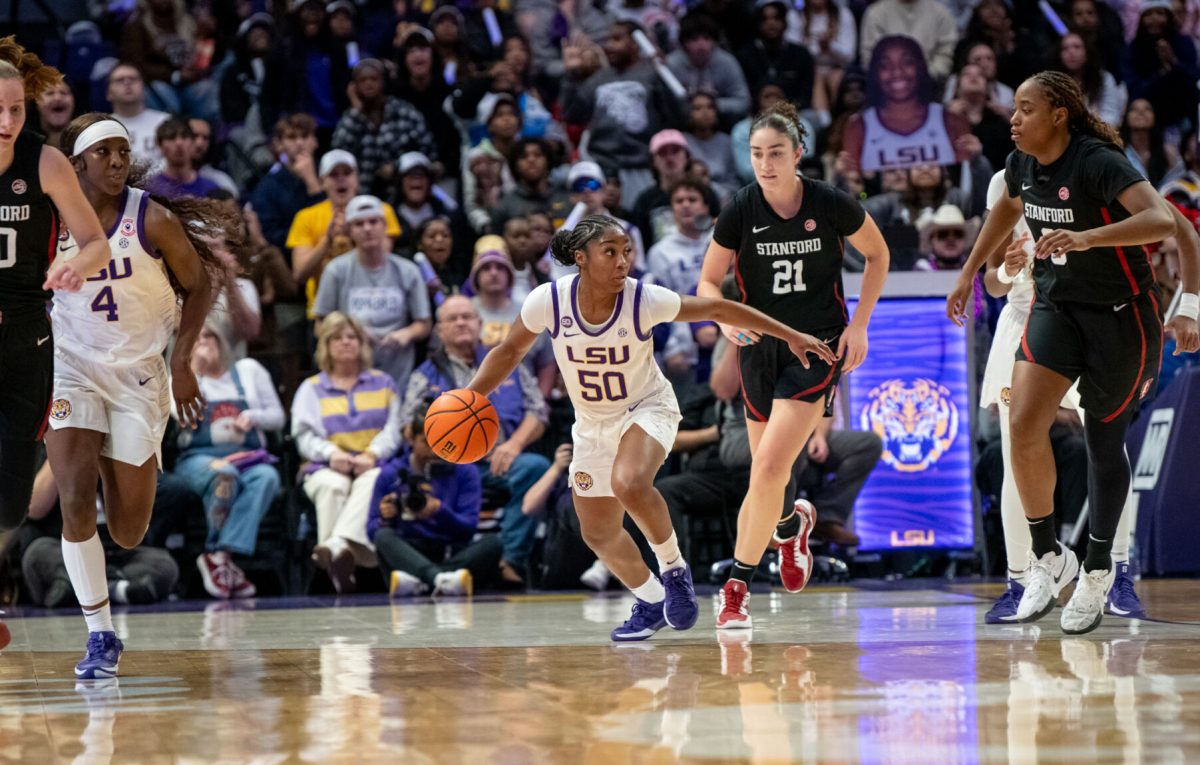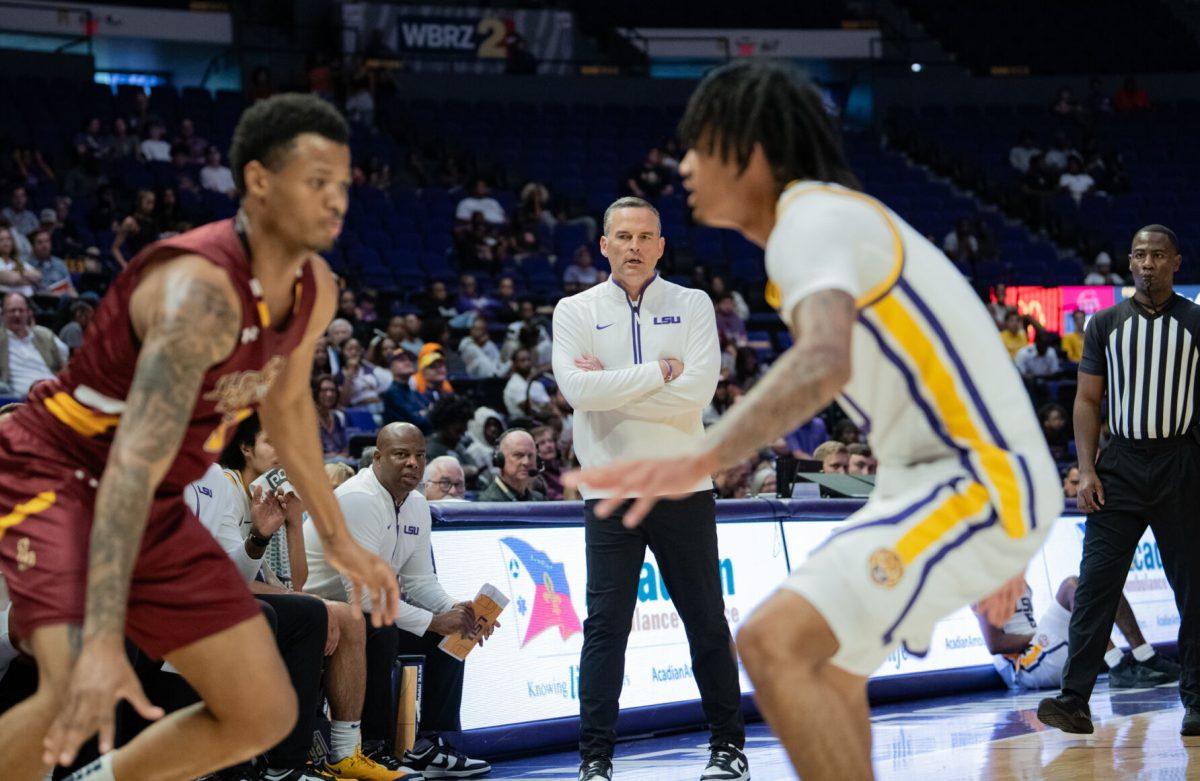The Raising Cane’s on Lee Drive was plastered with Ed Orgeron’s face. Cardboard cutouts of him in different poses guarded the rooftop of the fast-food restaurant, and the bright yellow “Coach O-Mobile” watched customers yearnfully outside the dining room as they came and went out of the parking lot. Purchasing a combo meal would award one with a cup with his smiling face on it. Just below the company’s distinct logo, the letter board cheered on the national championship-winning football coach with “Geaux Coach O!”
Then, Scott Woodward announced the sixth-year head coach would not be returning at the end of the season, after obtaining a record of 9-9 since the triumphant lift of the national championship trophy in New Orleans. As quickly as Orgeron rose to power and fell from grace, so too did his imagery throughout the Raising Cane’s. The cutouts left their posts on the roof, and the Coach-O Mobile drove on to a new pasture. There is no better microcosm to explain the shift from the most popular man in Louisiana to an ousted one-hit-wonder.
It seems not too long ago Ed Orgeron was cruising down I-10 early in the morning with the windows down blaring Creedence Clearwater Revival’s “Born on the Bayou,” en route to accept his dream job, LSU’s head football coach. Shaking Joe Alleva’s hand and signing the dotted line after taking over the team in the wake of Les Miles’s firing midseason had to be his proudest moment to date.
He quickly experienced hardship and ecstasy, in the devastating loss to Troy and the miraculous comeback against Auburn in 2017. Yet, the team was capped by the hiring of Matt Canada as the offensive coordinator. Orgeron will admit the choice was not his best, as Canada’s offense didn’t translate with the style of football LSU wanted to play.
The spring of 2018 quickly arrived with the departure of Danny Etling. Orgeron found himself holding a quarterback competition between Myles Brennan, Lowell Narcisse, Justin McMillan, and a late transfer from Ohio State named Joe Burrow. With two years of eligibility left, Burrow won the job and led the team to a successful 10-win season, punctuated by an impressive Fiesta Bowl win over a talented UCF squad. Although the team would lose Butkus Award winner Devin White along with other talented veterans, expectations were high for LSU to break out in 2019.
So began the greatest season in LSU’s and college football’s history. From 3rd and 17 against Texas, to Jacoby Stevens’s leaping one-handed interception against Mississippi State, to Ja’Marr Chase’s earth-shaking touchdown to seal the Florida win, to finally triumphing over Alabama in Tuscaloosa after eight-straight losses. To running over Georgia and Oklahoma on their way to beating Trevor Lawrence and Clemson in the Superdome in front of Louisiana’s faithful, it was a gift of a season from above. Burrow won the Heisman, Chase won the Biletnikoff, Grant Delpit won the Jim Thorpe, and Orgeron won Coach of the Year. His vision of ‘one team, one heartbeat’ manifested into 15 wins and a championship title.
Orgeron landed a massive contract extension. The success was immeasurable. The peak of the mountain had been reached.
The descent began. Orgeron divorced his wife shortly after his team’s victory. Then the onset of the COVID-19 pandemic hindered everyone’s ability to live their normal lives. The LSU coach experienced difficulty replacing so much of the talent that was now headed to the NFL.
Dave Aranda, LSU’s defensive coordinator, and Joe Brady, one of the talented offensive minds on LSU’s staff, left to pursue new job opportunities. Orgeron hired old friends Bo Pelini and Scott Linehan to take their places. The team turnover was too much.
LSU gave up the most passing yards in SEC history: 623 yards to Mississippi State’s KJ Costello and lost their first game of the season. Off the field, stories began to leak of LSU’s Title IX mishandlings, and Orgeron’s dealing of former LSU players Derrius Guice and Drake Davis put him in the spotlight. Injuries and opt-outs started to pile up, and the team scrounged up wins against Florida and Ole Miss to finish 5-5. LSU then self-imposed a bowl ban. Orgeron promised to correct the staggering mistakes made.
He brought in two first-time coordinators Daronte Jones and Jake Peetz to replace Pelini. Steve Ensminger made an effort to return his entire starting offensive line and replaced offensive line coach James Cregg with Brad Davis in June. Orgeron admitted that before he did not vet the hires he made before, and swore this team would respond differently because he was the one calling the shots now.
Orgeron walked into the Rose Bowl in his pressed suit and LSU pin, flanked by his security. Looking up, he retorted a heckling UCLA fan, telling him they had something for him “in his sissy blue shirt.” LSU lost 38-27. The team had another chance to redeem itself against Auburn in a packed house under the lights of Death Valley. LSU lost 24-19. By the time the Kentucky game transpired, Woodward was already working on gathering money to pay Orgeron’s $17 million buyout and remove him from his dream position. Despite a win against a ranked Florida the next week, Woodward officially announced the deed had been done the next day. It was curtains for Ed Orgeron.
No one denies the memories made on the climb won’t be cherished. Hopefully, the governing administration can say the lessons they learned afterward will be used in making a better hire in the future. There’s a dispute about what Orgeron’s legacy will be, between the golden 2019 national championship flag waving in the Baton Rouge wind or the piling of negative energy caused by on and off-the-field events that came to light after.
There’s no disputing this: Ed Orgeron’s rise and fall was a sight to behold. That sentiment will park itself in fans’ minds longer than the Coach-O Mobile was outside Baton Rouge’s favorite spot for chicken tenders.






